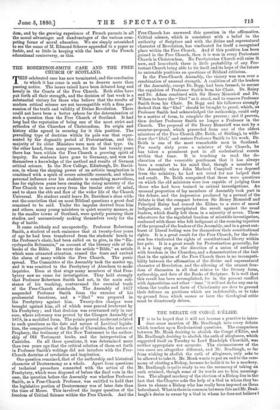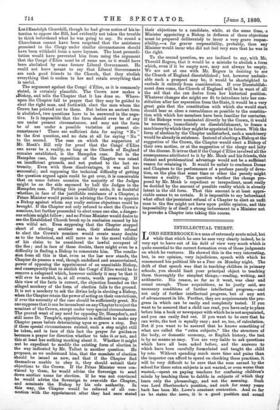THE DEBATE ON CONGE D'ELIRE.
I T is to be hoped that it will not become a practice to intro- duce some mention of Mr. Bradlaugh into every debate which touches upon Ecclesiastical questions. The comparison between Mr. Monk desiring to abolish the Conoi d'Elire, and Mr. Bradlaugh desiring to abolish the oath of allegiance, which suggested itself on Tuesday to Lord Randolph Churchill, was neither appropriate nor accurate. The circumstances of the two cases are altogether different, and Mr. Bradlaugh, so far from wishing to abolish the oath of allegiance, only asks to be allowed to take it. Mr. Monk wants to put an end to the cere- mony of electing a Bishop, because he holds it to be a mockery. Mr. Bradlaugh is quite ready to see the ceremony of taking an oath retained, though some of its words are to him meaning- less. The alleged mockery of the election of a Bishop lies in the fact that the Chapter asks the help of a God in whom they be- lieve to choose a Bishop who has really been imposed on them beforehand. What ie there in common between this and Mr. Brad- laugh's desire to swear by a God in whom he does not believe? Lord Randolph Churchill, though he had given notice of his in- tention to oppose the Bill, had evidently not taken the trouble to think beforehand what he was going to say. So sound a Churchman cannot have been surprised that the assistance promised to the Clergy under similar circumstances should have been withheld from a mere layman. The least premedi- tation would have prevented him from using the argument that the Conga d'Elire must be of some use, or it would have been abolished by some former Liberal Government. He could not have meant to say that Liberal Governments are such good friends to the Church, that they abolish everything that is useless to her and retain everything that is useful.
The argument against the Cong6 d'Elire, as it is commonly stated, is certainly plausible. The Crown now makes a 'Bishop, and tells the Chapter that it has done so. Where- upon the Chapter fall to prayer that they may be guided to elect the right man, and forthwith elect the man whom the Crown has pointed out to them. But before an ancient form is abolished, two questions have to be answered in the nega- tive. Is it impossible that the form should ever be of any use under present circumstances, and may not the form be of use under a possible variation of present cir- cumstances? There are sufficient data for saying "No" to the first question, and no data at all for saying " No " to the second. The case on which the supporters of Mr. Monk's Bill rely for proof that the Cone d'Elire can never be a reality, so long as the Church of England remains established, is the Hampden case. But in the Hampden case, the opposition of the Chapter was raised on insufficient grounds, and not pushed to the last ex- tremity. Even with these disadvantages, it was all but successful; and supposing the technical difficulty of getting the question argued again could be got over, it is conceivable that on some future occasion the majority of the Judges might be on the side espoused by half the Judges in the Hampden case. Putting this possibility aside, it is doubtful whether, in face of the justifiable resistance of a Chapter, a Prime Minister would persist in advising the Crown to appoint a Bishop against whom any really serious objections could be brought. If the Chapter not only refused to elect the Crown's nominee, but further proceeded to elect some one else, a danger- ous schism might follow ; and no Prime Minister would desire to see the Established Church break up in confusion caused by his own wilful act. Even supposing that the Chapter stopped .short of electing another man, their absolute refusal to elect the Crown's nominee would create many doubts as to the technical, and still more as to the moral validity of his claim to be considered the lawful occupant of the See ; and in face of these doubts, there might even be a difficulty in finding a Bishop to consecrate him. The conclu- sion from all this is that, even as the lax now stands, the Chapter do possess a real, though undefined and unascertained, power of opposing the appointment of an unsuitable Bishop, and consequently that to abolish the Conge d'Elire would be to remove a safeguard which, however unlikely it may be that it will ever be needed, is, at all events, worth preserving. If this view of the facts is correct, the objection founded on the alleged mockery of the form of election falls to the ground. It is not a mockery to ask the divine help in electing a Bishop, when the Chapter retain the power of acting on their convictions, if ever the necessity of the case should be sufficiently great. No one supposes that it can be incumbent on any Chapter to reject the nominee of the Crown, except under very special circumstances. The proved want of any need for opposing Dr. Hampden's, and still more Dr. Temple's, appointment is sufficient to make any Chapter pause before determining upon so grave a step. But if these special circumstances existed, such a step might still be taken, and in face of this fact the prayer for guidance becomes a prayer for direction whether to take it or not, and this at least has nothing mocking about it. Whether it might not be expedient to modify the existing form of election in the way indicated by Mr. Talbot is another question. He proposes, as we understand him, that the mandate of election should be issued as now, and that if the Chapter find themselves unable to obey it, they should submit their objections to the Crown. If the Prime Minister were con- vinced by them, he would advise the Sovereign to send down another name for election. If he was not convinced he would advise the Sovereign to over-ride the Chapter, and nominate the Bishop by his sole authority. In this way, the Chapter would be relieved of all con- nection with the appointment after they had once stated their objections to a candidate, while, at the same time, a Minister appointing a Bishop in defiance of these objections must be prepared deliberately to incur a very grave respon- sibility,—a far graver responsibility, probably, than any Minister would incur who did not feel very sure that he was in the right.
To the second question, we are inclined to say, with Mr. Thorold Rogers, that it would be a mistake to abolish a form which, even if it be empty now, may not always be empty. We are not at one with Mr. Rogers in desiring to see the Church of England disestablished ; but, however undesir- able such a prospect may be, it would be shortsighted to exclude it entirely from consideration. If ever Disestablish- ment does come, the Church of England will be in want of all the aid that she can derive from her historical position. Whatever changes she might see fit to introduce into her con- stitution after her separation from the State, it would be a very great gain that the constitution with which she would start should bear as close a resemblance as possible to the constitu- tion with which her members have been familiar for centuries. If the Bishops were nominated directly by the Crown, it would be necessary, immediately on disestablishment, to frame a machineryby which they mightbe appointed in future. With the form of election by the Chapter undisturbed, such a machinery would be already in existence. Instead of electing a Bishop at the suggestion of the Crown, the Chapter would elect a Bishop of their own motion, or at the suggestion of the clergy and laity of the diocese. It is true that if the Conge d'Elire involved all the consequences attributed to it by Mr. Monk and his friends, this distant and problematical advantage would not be a sufficient reason for retaining it. It would be unfair to condemn Deans and Chapters to the performance of a profane parody of devo- tion, on the plea that some time or other the parody might become a reality. The question whether the change pro- posed by Mr. Monk is expedient or inexpedient, must really be decided by the amount of possible reality which is already latent in the old form. That this amount is at least appre- ciable seems to us certain. It is impossible to say beforehand what effect the-persistent refusal of a Chapter to elect an unfit man to the See might not have upon public opinion, and this impossibility is of itself a strong inducement to a Minister not to provoke a Chapter into taking this course.



































 Previous page
Previous page